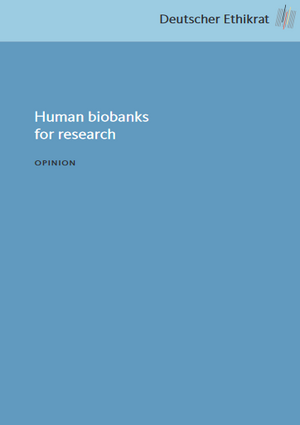Human Biobanks for Research
Published: 15 June 2010
The term human biobanks usually refers to collections of samples of human body substances (e.g. tissue, blood, DNA) which are linked to personal data and in particular to health information about the donors. They play a central role in research on the causes and mechanisms of a large number of illnesses and their treatment, and are an indispensable resource for biomedical research.
The increasing dynamic development in this area of research has prompted the German Ethics Council to deal again with the topic; both the former German National Ethics Council and the Study Commission "Recht und Ethik der modernen Medizin" of the German Bundestag had considered biobanks in earlier statements.
Biobanks raise ethical and legal questions which extend from the protection of individual rights to the global governance of research infrastructures. The Gesetz über genetische Untersuchungen bei Menschen (Human Genetic Examination Act, also known as Genetic Diagnosis Act), which entered into force in February 2010, contains no provisions on these questions. At present, there are no specific statutory provisions for biobanks in the field of scientific research in Germany. In view of the growing challenges, the German Ethics Council calls for specific legal regulations on human biobanks.
Previous concepts on the protection of donors' interests have been essentially based on the donors' informed consent. However, biobanks have special structural features, and consequently an individual's consent can give only limited protection, since it is given against the background of limited information. The concept of consent should therefore be supplemented by institutional and procedural rules which both set objective limits and also permit flexibility for research with biobanks.
In its Opinion, the German Ethics Council proposes a five-pillar concept for biobank legislation. It includes recommendations on the introduction of biobank secrecy, the definition of permissible use, the involvement of ethics commissions, quality assurance in connection with data protection and on transparency of the aims and procedures of a biobank. The recommendations aim to provide an adequate legal framework for the donors' interests and personal rights, to increase legal certainty for biobank research and, at the same time, to facilitate research.

